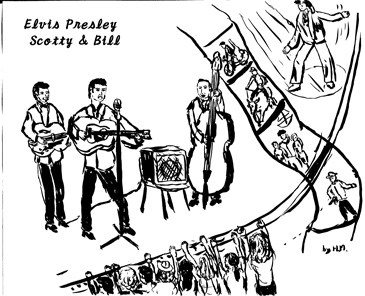

No matter what anyone may say, he is the singer of the 20th century. Also in Japan, especially people now around the age of 60 may have him one of their heroes. Different from the Beatles who are appreciated almost unanimously, however, some may feel something shy with listening to Elvis. Since after the Beatles Elvis has an aspect as a symbol of the old Establishment, his gorgeous appearance in "Elvis on stage" on and after the late '60s is likely to be a sort of joke. In spite of it, inevitably there is a limit of generation, in which something of little importance today used to have been epoch-making, and then such a pile of the past leads to the present. One of Elvis's great achievements should be that he interpreted black music in his own way and that he became one of fuses for blacks to have 'crossover' towards the white audience.
You may find yourself surprised when you see music-business magazine Billboard's charts of the late '50s, appeared on the liner-notes of "The Sun Records Collection" or "The King of Rock 'N' Roll -The Complete 50's Masters". Hits of Sun Records' rockabilly men including Elvis, Carl Perkins or Jerry Lee Lewis are listed in the upper position not only on the pop chart but on the country or the R&B. Since the number of airplays on radio stations becomes a large part of points on Billboard's charts, that situation means, in other words, rockabilly tunes (especially Sun's ones) had been put on the air by pop, country or R&B stations. Rockabilly under the influence of country and R&B won enormaous popularity and was sent from every station to every race. This never happened in the '60s when R&B stations got less to play Elvis, and this will never happen today when every person has got one's own, one and only taste.
In the Sun years Elvis had many country sides like Bill Monroe's Blue Moon of Kentucky or I Forgot to Remember to Forget on the one hand, he also had R&B or blues renditions including Arthur Crudup's That's All Right, Roy Brown's Good Rockin' Tonight or ex-labelmate Little Junior's Mystery Train on the other : these tunes suggest Elvis should have had a strong attitude of "singing what I like" since before he turned from Sun to RCA records. This is quite different from the '50s usual attitude of covering black's hits instantly and intercepting larger audience. What supported the attitude of Elvis and Sun's owner Sam Phillips should be the rhythm of Scotty Moore's electric guitar and Bill Black's up-right bass, both of them once had stayed in a hillbilly band Doug Poindexter & the Starlite Wranglers (who had only two recordings like My Kind of Carryin' on).
At RCA where the three moved to and only Elvis pushed forward, he had some readings worth his name among those which include modedrate covers of Little Richard (as for Richard, I have seldom heard any cover compared with his fierce originals). Although his renditions of Big Mama Thorton's Hound Dog or Smiley Lewis's One Night are sung in the lyrics lighter than the originals, Elvis had ardor for reproducing the intensity or impact of the originals in his own way. And then he mixes country and R&B in such a proper way that he reads country man Hank Snow's (Now and Then There's) A Fool Such As I into the doo-wop style like Billy Ward & The Dominos's Sixty Minutes Man. Besides his naturally commercial motivation for selling records, Elvis seems to throw into your heart his feeling like, "There's such a good song and everyone should try it". And then 'good song' for him happens to be country or R&B or gospel or standard pops.
Elvis of the '50s sang mainly in the rockabilly style including Don't Be Cruel and in the ballad style including Love Me Tender, and he showed various kind of styles on the bests covering all of his career like "Elvis 30 #1 Hits" or "Elvis 2nd to None". I smile unconsciously when I hear the atmosphere of second-rate movies of the '60s appeared on Viva Las Vegas and so on, however, it is worth listening to his country rock on and after "From Elvis in Memphis"(you can hear some compilations like "The Country Collection" or the Japanese compilation "Country Rock"). It was a new discovery for me that Willie Nelson's Always on My Mind or Ronnie Milsap's Any Day Now (its original is R&B singer Chuck Jackson's) are sung by Elvis during his country rock years. Moreover, in spite of the country style of chorus arrangements I think that his Memphis recordings should cause soulful feeling with the tightness of rhythms and the touch of echoes, for they were produced by Chips Moman, who contributed deeply to southern soul.
There is a fanatic who is my acquaintance and had spent years with Elvis and has got far older than him. In the man's point of view, Elvis is the best in the second-rate movie era of the '60s. Its two-set compilation "Command Performances" gives me that 'good voice', a bit heart-rending in the higher range and mellow in the lower, backed by various sounds from typical soundtracks to rather good finds like A Little Less Conversation or Change of Habit. His voice, more refined than country and stabler than R&B or soul, is rather a 'good voice' of a standard crooner like Frank Sinatora. Anyway, because of the meeting of this 'good voice' and 'good song', his music finally went over several fences. I guess so. (2005/05/08)(2007/07/14)